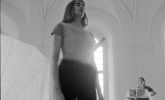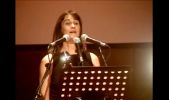Entarctic Shelf Festival: 23 June – 3 July, 1995
Voice Unvoiced was a joint project of two of Australia’s most innovative vocal composer-performers who have come together from divergent background and interact to create new contexts which define constantly evolving and changing parameters for the performance of texts and voice. The very diversity of their fields of reference and experience weave, collide, contradict and coexist as the cross thresholds between predefined and improvised material. Through solos and duos they develop a unique combination of a singer’s approaches to the voice, text, sub-texts, utterances which are abstracted fragments from textual sources or spontaneous “inventions” spoken, wailed, groaned, whispered, screamed, laughed, lamented, and celebrated.
J. Truman/A. Stewart 1995
Josephine Truman (1958) is an Australian singer, composer and performer whose focus is the voice and its ultimate potentials. Truman has a background in classical piano and singing and has been improvising since a young child and also studied art at Hornsby Technical College and Alexander Mackey College of Fine Arts (COFA). In 1993 Truman received a Special Purpose Award from the Australia Council's Music Board. In 1985, she was awarded an International Study grant from the Music Board to continue her study and performance of vocal improvisation in England and Holland. She was based in London, studying voice with David Mason and working with British improvisers. Later, she moved to Amsterdam, Holland, and became involved with European new music, jazz and improvisation. She studied jazz vocals and also counterpoint with Misha Mengelberg at the Sweelinck Conservatorium. Following this, she was guest student for one year at the Royal Conservatorium of Den Haag. During this time she also worked with John Cage on his Song Books, this version being broadcast on VPRO radio.In Europe, Truman worked as a vocalist with leading lights in new music, jazz and improvisation. Truman has also worked as a freelance radiophonic feature maker, producing many audio art programs and horspiel commissioned by the ABC and WDR (Koln), which feature her music, texts and original concepts and compositions. She has competed an MMus at the Sydney Conservatorium of Music with High Distinction with her thesis "Extreme Throats: extended vocal techniques in Contemporary Music of the C20 & C21".
Truman integrates her drawing and painting skills into her multimedia work in an ongoing exploration of the relationship between visual and sound arts. She conducts vocal workshops, teaches piano and voice privately, and drawing and painting at Sydney and regional community colleges. Jo Truman’s remarkable voice exceeds three octaves, from dark mezzo to high soprano, improvising flights of song, birdcalls and didjeridu cries, resonant with microtonal complexities and haunting overtones.
Amanda Stewart (b. 1959) is a contemporary Australian poet and sound/performance artist. She began writing and performing poetry in the 1970s and has since produced a wide array of sound, video and multimedia work. In the 1980s she worked for ABS radio as a producer. In 1989 she co-founded the performance ensemble Machine for Making Sense with Chris Mann, Rik Rue, Jim Denley and Stevie Wishart, and in 1995 started the trio Allos. She has toured Europe, the United States and Japan. She co-wrote and directed the 1990 film Eclipse of the Man-Made Sun about nuclear weapons in popular culture. Her opera The Sinking of the Rainbow Warrior, written with the composer Colin Bright, was performed as part of the Sydney Festival on Sydney Harbour in 1997. It has since been produced for radio by the ABC. Her collected works book and CD entitled I/T won the 1999 Anne Elder Award for poetry.
Amanda Stewart
The voice is that unique instrument with the ability to synthesise semantic, musical, analytical and emotional structures. If we look below the surface of speech we find beginnings, residues, disjunctions- the flux of complex oral and propositional codes that recombine at the edge of distinction (culture).
espokentheheardthesaidseenrememberedwrittenrecordedmadextrainterdetermi
Recently, I’ve been interested in exploring disjunctions between different oral, written and electronic ‘forms of inscription’ or modes of memory in solo works and in collaborations as a poet, performer and improviser. For some time I explored how musico-poetic systems work within discourse. I researched particular discourses to try and see how they were interarticulated by various individuals and institutions using specific syntax, vocabulary and mythic structures, as well as certain non- verbal and musical architectures with different intonational, rhythmic, timbral, dynamic and pitch systems. I wanted to hear what sort of subject a specific mode of address assumed, the paradigms it was capable of invoking and how it set up its connections. I became interested in the complexity of oral grammars which function, at different levels simultaneously, within speech and in our use of the voice. In particular I was interested in the mesh of systems at work within Australian speech.
natextraintersubjectivecontextfielduseotherexchangeintimatedistancesensitivedou
In some of my poems, like postiche, semantic sequences are tightly scored on tape and in print. In this case, a poem consists of two entities, a written score which is open to lateral interpretation and an aural score which remains fixed and immutable. In other pieces, I use a number of parallel scores so that it is not possible to perform ‘the whole work’. ‘The work’ is the work of a process of engagement with overlapping fields of notation.
btherubofparadigmstensionsigntimerelationsbetweenquestionsbeingnotknowing.
These recent electroacoustic pieces compose with relationships and distinctions between language, music, logic, speech, incorporating ideas from linguistics, psychoanalysis, science and philosophy. These modes are juxtaposed with specific compositional and extended vocal techniques. The vocalist must generate her/his performance from a multi-paradigmatic reference field of notations and implied utterances. Many of these potential utterances remain unarticulated, so that the pieces are as much about what is not uttered as what is. For example, several of these works deal with subject-verb-object relations where the performer (x) is caught between two sets of scores (i/it). One pair of scores (i) is recorded (split left and right) on tape.
The other pair (it) is written (split left and right) on paper. The vocalist (x) listens to the two aural scores while simultaneously negotiating the two written scores and must generate her/his performance from this interaction. In Ô mt Õ, for voice, mini disc and modular texts, miniature poems recorded onto mini-disc are played on random shuffle to form a new poem which the performer must negotiate in her performance. Fields of reference collide, converse, contradict and modulate each other as well as coexist without reference to each other.
ifonefollowsdeviantgrammaticalrulesitmaynotmeanthatoneisayingsomethingwrong
Played by discourse, the voice contains the antecedents and technologies of cultural assumptions; how sound is sorted into structure, the grammar of distinctions. The voice offers one of the most complex listening fields as it has the ability to laterally slide between a range of systems. It is possible to construct a multi-referential field of signifiers. To reveal the listening subject beyond the edge of it/self. A subject in flux. A subject caught in a multi-causal simultaneity of the uttered and the unsounded.
International Festival of Poetries + Polypoetries, PROPOSTA, 2004


